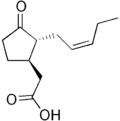Octadecanoid pathway
The octadecanoid pathway is a biosynthetic pathway for the production of the phytohormone jasmonic acid (JA), an important hormone for induction of defense genes. JA is synthesized from alpha-linolenic acid, which can be released from the plasma membrane by certain lipase enzymes. For example, in the wound defense response, phospholipase C will cause the release of alpha-linolenic acid for JA synthesis.

Jasmonic acid
Alpha-linolenic acid
In the first step, alpha-linolenic acid is oxidized by the enzyme lipoxygenase. This forms 13-hydroperoxylinolenic acid, which is then modified by a dehydrase and undergoes cyclization by allene oxide cyclase to form 12-oxo-phytodienoic acid. This undergoes reduction and three rounds of beta oxidation to form jasmonic acid.[1]
Footnotes
gollark: Yes, it's really bees. Inconsiderate of the criminals.
gollark: > but stop crying then that they aren't happy with that<:bees:724389994663247974>
gollark: I mean, unless you go around murdering people.
gollark: It would obviously be better if homophobia was unexisted faster.
gollark: What?
References
- Peter J Davies. Plant Hormones: Physiology, Biochemistry and Molecular Biology. Kluwer Academic Press. p. 836. ISBN 978-0-7923-2985-5.
- Hans Weber (2002). "Fatty acid-derived signals in plants". Trends in Plant Science. 7 (5): 217–224. doi:10.1016/S1360-1385(02)02250-1. PMID 11992827.
This article is issued from Wikipedia. The text is licensed under Creative Commons - Attribution - Sharealike. Additional terms may apply for the media files.